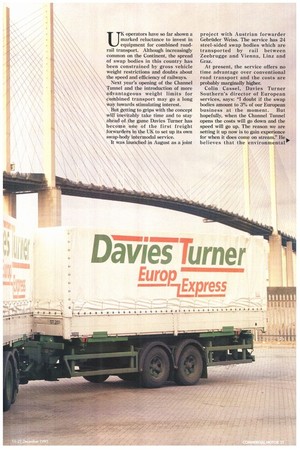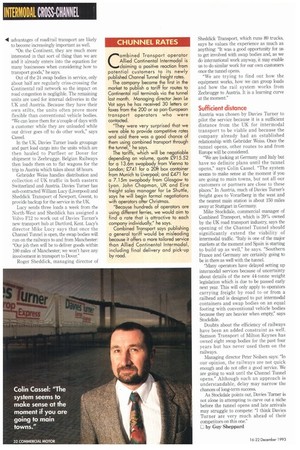U K operators have so far shown a marked reluctance to
Page 33

Page 34

If you've noticed an error in this article please click here to report it so we can fix it.
invest in equipment for combined roadrail transport. Although increasingly common on the Continent, the spread of swap bodies in this country has been constrained by gross vehicle weight restrictions and doubts about the speed and efficiency of railways.
Next year's opening of the Channel Tunnel and the introduction of more advantageous weight limits for combined transport may go a long way towards stimulating interest.
But getting to grips with the concept will inevitably take time and to stay ahead of the game Davies Turner has become one of the first freight forwarders in the UK to set up its own swap-body intermodal service.
It was launched in August as a joint project with Austrian forwarder Gebriider Weiss. The service has 24 steel-sided swap bodies which are transported by rail between Zeebrugge and Vienna, Linz and Graz.
At present, the service offers no time advantage over conventional road transport and the costs are probably marginally higher.
Colin Cassel, Davies Turner Southern's director of European services, says: "I doubt if the swap bodies amount to 3% of our European business at the moment. But hopefully, when the Channel Tunnel opens the costs will go down and the speed will go up. The reason we are setting it up now is to gain experience for when it does come on stream." He believes that the environmental
• advantages of road/rail transport are likely to become increasingly important as well. "On the Continent, they are much more interested in that sort of thing than we are and it already enters into the equation for many businesses when considering how to transport goods," he says.
Out of the 24 swap bodies in service, only about half are regularly criss-crossing the Continental rail network so the impact on road congestion is negligible. The remaining units are used for internal deliveries in the UK and Austria. Because they have their own stilts, the units often prove more flexible than conventional vehicle bodies. "We can leave them for a"couple of days with a customer while they are unloaded while our driver goes off to do other work," says Cassel.
In the UK, Davies Turner loads groupag-e and part load cargo into the units which are then hauled to Purfleet or Dover for shipment to Zeebrugge. Belgian Railways then loads them on to flat wagons for the trip to Austria which takes about 48 hours.
Gebrtider Weiss handles distribution and collection of UK traffic in both eastern Switzerland and Austria. Davies Turner has sub-contracted William Lucy (Liverpool) and Sheddick Transport of Newport. Gwent, to provide backup for the service in the UK.
Lucy sends three loads a week from the North-West and Sheddick has assigned a Volvo F12 to work out of Davies Turner's new transport hub at Dartford, Kent. Lucy's director Mike Lucy says that once the Channel Tunnel is open, the swap bodies will run on the railways to and from Manchester: "Our job then will be to deliver goods within 100 miles of Manchester; we won't have any involvement in transport to Dover."
Roger Sheddick, managing director of Sheddick Transport, which runs 80 trucks, says he values the experience as much as anything: "It was a good opportunity for us to get involved with swap bodies and, as we do international work anyway, it may enable us to do similar work for our own customers once the tunnel opens.
"We are trying to find out how the equipment works, how we can group loads and how the rail system works from Zeebrugge to Austria. It is a learning curve at the moment."
Sufficient distance
Austria was chosen by Davies Turner to pilot the service because it is a sufficient distance from the UK for intermodal transport to be viable and because the company already had an established relationship with Gebrtider Weiss. Once the tunnel opens, other routes to and from Europe will be considered.
"We are looking at Germany and Italy but have no definite plans until the tunnel opens," says Colin Cassel. "The system seems to make sense at the moment if you are going to main towns, but not all our customers or partners are close to these places." In Austria, much of Davies Turner's freight goes to Vorarlberg in the west and the nearest main station is about 150 miles away at Stuttgart in Germany.
Mike Stockdale, commercial manager of Combined Transport, which is 39% owned by the UK road transport industry, says the opening of the Channel Tunnel should significantly extend the viability of intermodal traffic. "Italy is one of the major markets at the moment and Spain is starting to build up as well," he says. "Southern France and Germany are certainly going to be in there as well with the tunnel, "Many operators have delayed setting up intermodal services because of uncertainty about details of the new 44-tonne weight legislation which is due to be passed early next year. This will only apply to operators carrying freight by road to or from a railhead and is designed to put intermodal containers and swap bodies on an equal footing with conventional vehicle bodies because they are heavier when empty," says Stockdale.
Doubts about the efficiency of railways have been an added constraint as well. Samson Transport of Milton Keynes has owned eight swap bodies for the past four years but has never used them on the railways.
Managing director Peter Neilsen says: "In our opinion, the railways are not quick enough and do not offer a good service. We are going to wait until the Channel Tunnel opens." Although such an approach is understandable, delay may narrow the chances of long-term success.
As Stockdale points out, Davies Turner is not alone in attempting to carve out a niche before the tunnel opens and late arrivals may struggle to compete: "I think Davies Turner are very much ahead of their competitors on this one."
L by Guy Sheppard




















































































